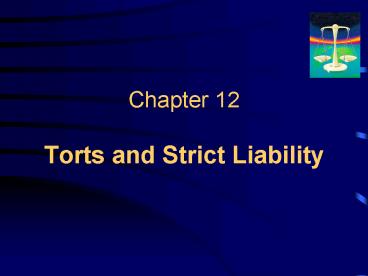Chapter 12 Torts and Strict Liability - PowerPoint PPT Presentation
1 / 20
Title:
Chapter 12 Torts and Strict Liability
Description:
Defense of property - Reasonable force may be used in attempting to remove ... to cause death or great bodily injury can never be used just to protect property. ... – PowerPoint PPT presentation
Number of Views:858
Avg rating:3.0/5.0
Title: Chapter 12 Torts and Strict Liability
1
Chapter 12 Torts and Strict Liability
2
Facing Tort Liability
- Tort
- Civil (as opposed to criminal) wrong not arising
from a breach of a legal duty owed by the
defendant to the plaintiff the breach must be
the proximate cause of harm to the plaintiff - Protected Interest
- Interest protected by law. Protected interest
includes civil rights and liabilities, freedom
from harms resulting from torts, criminal actions
and so on.
3
The Basis of Tort Law
- Damages
- Money sought as a remedy for a breach of contract
or the commission of a tort. - Intentional Tort
- Civil (as opposed to criminal) wrong knowingly
committed (and not arising from breach of
contract). - Tortfeasor
- One who commits a tort.
4
Intentional Tort against Persons
- Assault
- Any word or action intended to make another
person fearful of immediate physical harm a
reasonably believable threat. - Battery
- The unprivileged, intentional touching of
another.
5
Intentional Tort against PersonsContinued
- Defense
- what a defendant offers and alleges in an action
or suit as a reason why the plaintiff should not
recover or establish what he or she seeks. - Liability
- Any actual or potential legal obligation, duty,
debt, or responsibility.
6
Defenses
- A number of legally recognized defenses can be
raised by a defendant who is sued for assault or
battery - Consent - When a person consents to the act that
damages him or her, there is generally no
liability for the damage done.
7
DefensesContinued
- Self defense - An individual who is defending his
or her life or physical well-being can claim
self-defense. In situations of both real and
apparent danger, a person is privileged to use
whatever force is reasonably necessary to prevent
harmful contact.
8
DefensesContinued
- Defense of others - An individual can act in a
reasonable manner to protect others who are in
real or apparent danger. - Defense of property - Reasonable force may be
used in attempting to remove intruders from
ones home, although force that is likely to
cause death or great bodily injury can never be
used just to protect property.
9
Intentional Tort against Persons - continued
- False Imprisonment
- Intentional confinement or restrain of another
persons movement without justification. - Intentional infliction of emotional distress
- An intentional act that amounts to extreme and
outrageous conduct resulting in severe emotional
distress to another.
10
Intentional Tort against Persons - Continued
- Defamation (libel or slander)
- A false statement of fact, not made under
privilege, that is communicated to a third person
and that causes damage to a persons reputation .
For public figures, the plaintiff must also prove
malice.
11
Intentional Tort against Persons Continued
- Invasion of the right to privacy
- Use of persons name or likeness for commercial
purposes without permission, wrongful intrusion
into a persons private activities, publication
of information that places a person in a false
light, or disclosure of private facts that an
ordinary person would find objectionable.
12
Intentional Tort against Persons Continued
- Fraudulent misrepresentation
- A false representation made by one party, through
misstatement of facts or through conduct, with
the intention of deceiving another and on which
the other reasonably relies to his or her
detriment.
13
Intentional Torts against Property
- Trespass to land
- Invasion of anothers real property without
consent or privilege.Specific right and duties
apply once a person is established as a
trespasser. - Trespass to personal property
- Unlawfully damaging or interfering with the
owners right to use, possess, or enjoy his or
her personal property.
14
Intentional Torts against PropertyContinued
- Conversion
- A wrongful act in which personal property is
taken from its rightful owner or possessor and
placed in service of another.
15
Unintentional Torts - Negligence
- Negligence
- The careless performance of legally required
duty or the failure to perform a legally required
act. - Elements that must be proved are
- that a legal duty exist
- that the defendant breached that duty
- that the breach caused damage or injury to another
16
Unintentional Torts - Negligence Continued
- Defenses to negligence
- The basic defenses in negligence cases are
- assumption of risk
- contributory and comparative negligence
17
Special Negligence Doctrines and Statutes
- Res ipsa loquitur - A doctrine under which a
plaintiff need not prove negligence on the part
of the defendant because the facts speak for
themselves. Res ipsa loquitur has been applied
to such events as trains derailing, wheels
falling off moving vehicles, and elevators
falling.
18
Special Negligence Doctrines and
StatutesContinued
- Negligence per se - A type of negligence that may
occur if a person violates a statute or an
ordinance providing for a criminal penalty and
the violation causes another to be injured.
19
Special Negligence Doctrines and
StatutesContinued
- Special negligence statutes
- State statutes that prescribe duties and
responsibilities in certain circumstances, the
violation of which will impose civil liability. - Dram shop acts and Good Samaritan statutes are
example of special negligence statutes.
20
Unintentional Torts - Strict Liability
- Under the doctrine of strict liability, a person
may be held liable, regardless of the degree of
care exercised, for damages or injuries caused by
his or her product or activity. - Strict liability includes
- liability for defective products (product
liability) and - liability for abnormally dangerous activities.































